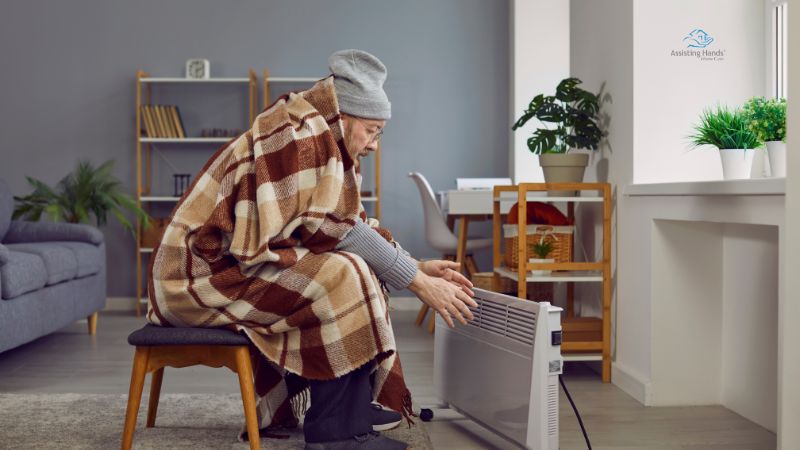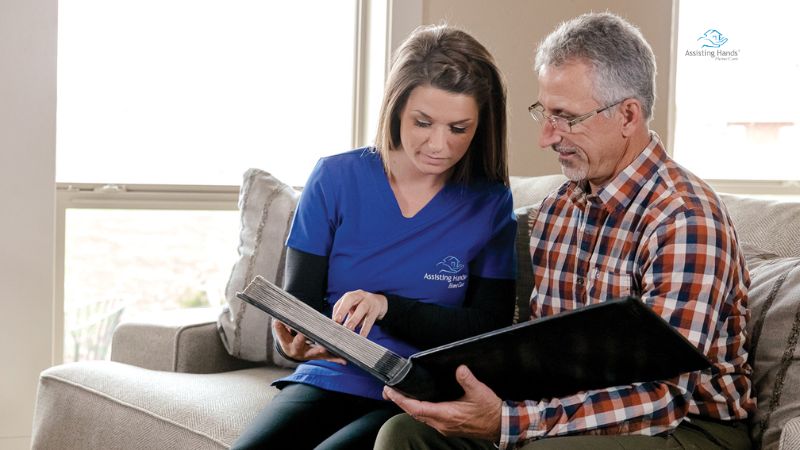

As winter arrives with its snowy beauty, it also brings challenges, especially for seniors. The cold weather and their weakened immune systems increase the risk of flu and pneumonia. Snowy and icy sidewalks add to the dangers. But don’t worry! In this article, we’ll discuss the specific winter challenges seniors face and offer some easy tips to help them enjoy the season without worries.
While it’s important to have support or home care in place for seniors, these winter safety tips for older adults are especially helpful in keeping them safe from common cold weather risks.
What Risks and Issues Do Seniors Face During Winter?
During the winter months, seniors encounter a variety of challenges that can significantly affect their physical health, mental well-being, and overall quality of life. These challenges stem from both environmental factors related to the season and age-related vulnerabilities that seniors may experience.
Physical Health Challenges
- Frostbite and Hypothermia: Older adults are particularly vulnerable to extreme cold temperatures, which can lead to serious conditions like frostbite, where the skin and underlying tissues freeze, and hypothermia, where the body temperature drops dangerously low. Due to age-related factors such as decreased circulation and slower metabolism, seniors may not be able to regulate their body temperature as effectively as younger individuals.
- Falling: Slippery surfaces caused by snow and ice increase the likelihood of falls among seniors. With age, individuals may experience declines in balance, strength, and coordination, making them more susceptible to fall-related injuries such as fractures and sprains.
- Flu and Pneumonia: Seniors have weakened immune systems, making them more susceptible to respiratory infections such as the flu and pneumonia. These illnesses can be severe and may lead to complications, particularly for older adults with underlying health conditions. Vaccination against the flu and practicing good hygiene habits can help reduce the risk of contracting these infections.
- Winter Itch: The dry, indoor air common during winter can cause skin to become dry, itchy, and irritated, especially for seniors with pre-existing skin conditions.
- Dehydration: Seniors may not feel as thirsty during winter, leading to inadequate fluid intake. Dehydration can exacerbate existing health issues and increase the risk of urinary tract infections and other complications.
- Cardiovascular Diseases: Cold temperatures can cause blood vessels to constrict, raising blood pressure and increasing the risk of cardiovascular events such as heart attacks and strokes. Seniors with existing heart conditions or hypertension need to take extra precautions to stay warm and monitor their cardiovascular health during the winter season.
- Arthritis and Joint Pain: Cold weather often exacerbates symptoms of arthritis and joint pain in seniors, leading to increased discomfort and reduced mobility.
Mental and Emotional Challenges
- Mental Health Issues and Loneliness: Winter weather can contribute to feelings of loneliness and isolation, particularly for seniors who may have limited social interactions or mobility. Seasonal affective disorder (SAD) and depression are also common among older adults during this time.
- Coping with Loss: For some seniors, the winter season may evoke memories of lost loved ones or past experiences, leading to feelings of grief and sadness.
What precautions can seniors take to stay safe in winter?

With some proactive measures and careful planning, seniors can stay cozy and safe throughout the winter season. Here are some essential tips to help seniors navigate the winter months with ease:
- Staying Warm Indoors: Seniors should keep their homes comfortably warm by setting the thermostat to at least 68°F (20°C). It’s important to ensure that heating systems are in good working condition and have them inspected annually. If they’re using space heaters, seniors should place them on a level surface away from flammable materials and never leave them unattended. Additionally, using draft stoppers and insulation can help prevent heat loss from doors and windows.
- Layering Up When Going Out: When venturing outside, seniors should layer their clothing to trap body heat and protect against the cold. Starting with a moisture-wicking base layer, adding an insulating layer like fleece or wool, and topping it off with a waterproof and windproof outer layer can help keep them warm. Seniors should also remember to wear a hat, gloves, and scarf to cover exposed skin and prevent heat loss from their extremities.
- Staying Active Indoors: Physical activity helps generate heat and keeps the body warm. Seniors can engage in indoor exercises like yoga, tai chi, or stretching routines to maintain flexibility and improve circulation. Joining a local senior center or gym that offers indoor activities tailored to older adults can also be beneficial. Even simple activities like chair exercises or walking around the house can help seniors stay active if they have mobility issues.
- Staying Hydrated: Seniors should remember that staying hydrated is equally important in winter, despite the cooler temperatures. The dry air can lead to increased fluid loss through respiration, so seniors should drink plenty of water throughout the day. Limiting caffeine and alcohol consumption is also important as they can contribute to dehydration.
- Eating Nutritious Meals: Consuming warm, nourishing meals can help seniors stay fueled and provide essential nutrients to boost immunity. Including plenty of fruits, vegetables, whole grains, and lean proteins in their diet is important. Soups, stews, and hot beverages like herbal tea or broth can also help keep seniors warm and hydrated.
- Preventing Slips and Falls: Seniors should be extra cautious of slippery surfaces during winter weather. Wearing sturdy, slip-resistant footwear with good traction when walking outside is essential. Using handrails and assistive devices for support when navigating stairs or uneven terrain can help prevent falls. Seniors should also keep pathways clear of snow and ice and consider using salt or ice melt to prevent buildup.
- Staying Connected: Winter weather can sometimes lead to isolation, which can have negative effects on mental and emotional well-being. Seniors should stay connected with friends, family, and neighbors through phone calls, video chats, or social gatherings. Joining community groups or clubs that offer activities and opportunities for social interaction can also help combat loneliness.
- Preparing for Emergencies: Seniors should be prepared for power outages or extreme weather conditions by having an emergency kit stocked with essentials such as non-perishable food, water, medications, flashlights, batteries, and a first-aid kit. Keeping a list of emergency contacts handy, including family members, neighbors, and healthcare providers, is also important.
- Getting Vaccinated: Seniors should protect themselves against seasonal illnesses like the flu by getting vaccinated annually. Flu vaccines are especially important for seniors as they have a higher risk of complications from the flu. Consulting with a healthcare provider to determine which vaccines are recommended is advisable.
- Staying Informed: Seniors should stay updated on weather forecasts and advisories to anticipate any severe weather conditions. Planning ahead and avoiding unnecessary travel during inclement weather is crucial. Signing up for local alert systems and having a reliable source of information to stay informed about any emergencies or evacuations is also recommended.
How can the home be modified to be safer for seniors in winter?
Below is a checklist highlighting actionable steps to improve home safety for seniors:
- Non-Slip Surfaces: Placing rugs or mats with strong grip in high-traffic areas like doorways and bathrooms significantly reduces the risk of slips and falls, especially when floors get wet from melted snow or ice.
- Winterize the home: While raising the thermostat helps to heat the home, valuable heat can still escape through small cracks or gaps in the doors and windows. Prevent unnecessary heat loss by applying caulk or weather stripping to these areas.
- Ample Lighting: Adequate indoor and outdoor lighting is essential for seniors to navigate their surroundings safely, particularly during the darker winter days. Well-lit pathways and properly illuminated staircases help prevent accidents.
- Shovel walkways: Clear sidewalks, steps and the driveway of snow and ice to promote safety when the senior walks outside or enters a vehicle. Salt all pathways (rock salt helps melt snow and ice). Caregivers and seniors should carry a small bag of salt in case they come across an icy patch.
- Sturdy Support Rails: Installing robust handrails along staircases and grab bars in bathrooms provides seniors with valuable support and stability, minimizing the chances of falls and injuries, especially in slippery conditions.
- Use heating units safely: Seniors may decide to stay warm by turning on a space heater. Caregivers must ensure the space heaters remain a safe distance from flammable items, such as curtains or bed sheets. Install a protective screen on the fireplace to prevent sparks from flying out.
- Install carbon monoxide detectors: When the fireplace is lit or gas heaters are turned on, carbon monoxide poisoning is a threat. Protect seniors and others in the home by installing a carbon monoxide detector in the room where fuel is primarily burned. Replace the batteries on the detector annually.
Consider Home Care Services for Seniors During Winter
During winter, home care services are like dependable companions for seniors, offering vital support in various ways. They ensure seniors eat well by planning nutritious meals and cooking delicious dishes together. Home care providers also encourage gentle exercises tailored to their needs, making sure they stay active and strong, which helps prevent falls. With their watchful eyes and caring hearts, these professionals create a safe environment, removing any potential hazards that could cause accidents. Beyond physical care, they provide companion care, chatting over a warm cup of tea or playing games to keep boredom at bay and loneliness away. In essence, home care services not only ensure seniors stay healthy and safe but also make their winters brighter and more enjoyable.
Assisting Hands for Senior Care

Count on Assisting Hands Home Care for reliable support, particularly during the challenging winters in Palos Heights, Illinois. Our caregivers ensure seniors navigate icy sidewalks safely and provide essential services such as medication pickup and grocery shopping during heavy snowfall. We also offer assistance with daily tasks, prepare nutritious meals, and provide companionship to combat loneliness. With our compassionate care, seniors can age comfortably at home, even during the coldest months.
Contact us today for a consultation or to know more about senior home care.
